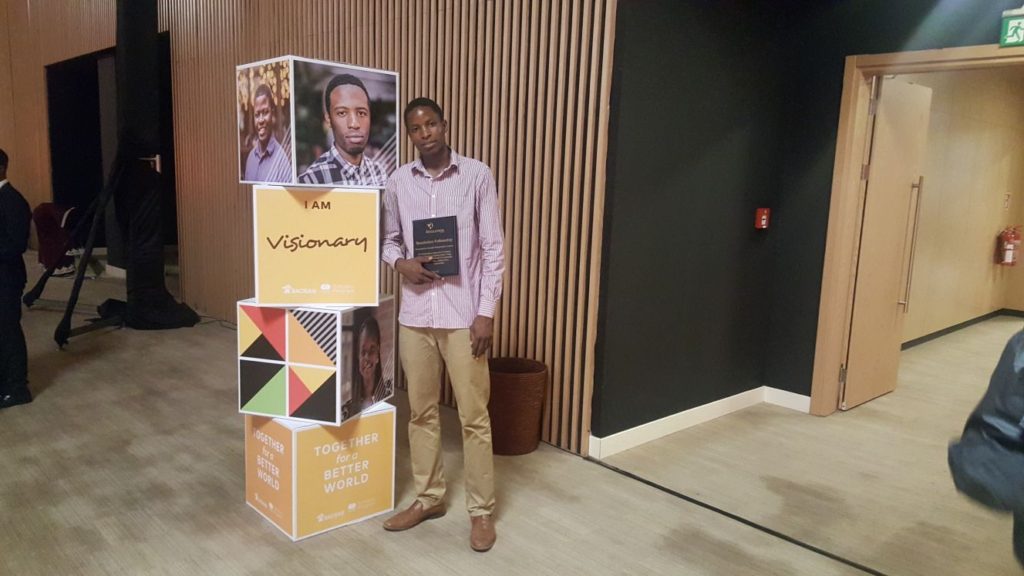Enabling Children and Youth in Rural Malawi to Access Reading Materials
Mastercard Foundation Scholars and The Resolution Social Venture Challenge
A young Malawian has created a new initiative to help vulnerable youth access reading materials in Lilongwe, Malawi. Created in 2015 by Masateru Honest Mwambo, Women for Peace Library will help meet the educational needs of children in primary school, laying a strong foundation for them to advance to better schools, and perhaps even to university one day.
Twenty-one-year-old Masateru is leveraging a grant awarded to him after winning the Resolution Social Venture Challenge to set up a library in his community of Mutu, a village within Lilongwe, enabling children and youth to access better books written in English and the national language, Chichewa.
The name Women for Peace Library originates from Women Federation for World Peace, WFWP, an Organization that offered Masateru a room to set up the library.
“I chose a name that can be easily identified in the community. The environment is usually called ‘Women’, so getting a map to the library would be easy. WFWP’s mission is helping the underprivileged group of people in the community especially disadvantaged women”.
With only one nursery, children in the village of Mutu do not usually progress to higher levels of education. It is also one of the factors that drove Masateru to improve the situation by motivating children to pursue higher levels of education through a well-equipped community library run by youth volunteers.
The electrical and electronics engineering student at Ashesi University is also a Mastercard Foundation Scholar, selected to the scholarship as a result of his academic talent, social consciousness, and leadership qualities. Masateru says he was lucky to attend good schools, something he wants for other youth in his community.
“Mutu is one of the most academically underprivileged communities in Lilongwe. In rural areas, the academic atmosphere is challenging. Mutu Village has only one nursery school, built by volunteers. There is a primary school in the neighboring village, and Secondary schools are hours of walking distance from this community, making it difficult for youth to attend,” said Masateru.
According to a 2010 UNESCO report, 4.7 million students in Malawi are enrolled in both primary and secondary school. Of this number, 83 percent are in primary school, but only 11 percent manage to officially complete primary school. After primary school, only seven percent complete secondary school and only one percent make it to university.
Masateru thinks that the presence of a system like Women for Peace Library could change the outlook for young Malawians because of the different academic experience the children and youth will receive.
“Unlike school, which is viewed as a ‘task to do,’ Women for Peace Library wants community youth to find hobbies that can enhance their academic performance. Some of the hobbies are reading fun books, and writing short stories. Furthermore, a mere provision of an environment rich with books, and a place they can visit whenever they want to, is a significant factor to alter out-of-school youth numbers,” he said.
As part of its future plans, Masateru says that Women for Peace Library would also like to open a computer lab that would help spread computer knowledge in rural areas and help community youth develop their basic computer programming skills.
He wishes to extend the same privileges which have made his academic journey a success to his fellow youth in Mutu and beyond.
“If they can access the same privileges, I strongly believe they can also start writing their stories of success. Acknowledging that these privileges have made me distinct within my community, I am trying my best to extend the same benefits to vulnerable youth and children in rural communities, where families are unable to send them to quality schools. After months of working with these youth, I have realized offering them a library can help improve their performance at school. I felt that such communities need to have a centre where community children and youth can access quality books and a sound study environment,” said Masateru.

Women for Peace Library won the Resolution Social Venture Challenge in 2018, a competition that rewards compelling leadership and promising social ventures led by youth. These young leaders earned a fellowship that includes seed funding, mentorship, and access to a network of young global change-makers to pursue impactful projects in their communities. A collaboration between the Mastercard Foundation and The Resolution Project, the Resolution Social Venture Challenge provides a pathway to action for socially responsible young leaders who want to create change that matters in their communities.
“As a Mastercard Foundation Scholar, I was privileged to be introduced to the Resolution Social Venture Challenge. After turning out as a winner, I have been fortunate to be part of the Resolution Fellowship. This is another extraordinary opportunity for me to build a global network that can have a positive impact on my project, maybe even eventually turning it into a national project,” he said.
Though he anticipates meeting some challenges along the way, such as convincing the children to come to the library and providing access to child-friendly librarians, Masateru is determined to achieve his dream.
“I have been working with high school graduate volunteers to take on the role of librarians. But with enough resources, I shall train them and make them paid employees. Although I won the Resolution Fellowship, Women for Peace Library’s success belongs to the community. That’s why I like Ashesi University’s favourite quote by a German playwright and thinker, Johann Wolfgang von Goethe, who said, ‘What you can do or dream you can, begin it; boldness has genius, power, and magic in it.’”
Pius Sawa is a freelance journalist based in Kenya. His stories have appeared in Reuters, Farm Radio International, and Inter Press Service.


